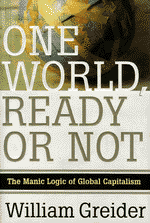

|

The Threat Of Global Capitalism
By Gregory McNamee
HOW IS IT that Mexico, once a breadbasket to the world,
now imports nearly a third of the grain it consumes? Why is it
that the neo-liberal development strategy for Third World nations
so warmly espoused by the International Monetary Fund and the
World Bank results almost always in failure? Why do the rich get
richer and the poor get poorer?
In his catastrophist look at the world economy, Rolling Stone
political columnist William Greider proposes a few answers, none
of them comforting.
 The new breed of robber-baron capitalism, he writes, cares nothing
for the welfare of workers, the health of nations, the devastation
of local economies and ecologies; in the global quest for profit,
what matters is short-term success and the ability to move quickly
from one colony to another when market conditions dictate. (Thus,
if workers in El Salvador begin to demand a living wage, a company
like Nike can relocate its plant to, say, Burundi overnight. When
the Burundians get antsy, it's off to the Andamans--or maybe Tucson,
in the fleeting case of Microsoft.) In such a rapidly changing
scenario, following the money and claiming a share of it becomes
a difficult proposition: Multinational companies shift and hide
assets, national banks become laundering enterprises, and resources
march away from developing countries, never to return.
The new breed of robber-baron capitalism, he writes, cares nothing
for the welfare of workers, the health of nations, the devastation
of local economies and ecologies; in the global quest for profit,
what matters is short-term success and the ability to move quickly
from one colony to another when market conditions dictate. (Thus,
if workers in El Salvador begin to demand a living wage, a company
like Nike can relocate its plant to, say, Burundi overnight. When
the Burundians get antsy, it's off to the Andamans--or maybe Tucson,
in the fleeting case of Microsoft.) In such a rapidly changing
scenario, following the money and claiming a share of it becomes
a difficult proposition: Multinational companies shift and hide
assets, national banks become laundering enterprises, and resources
march away from developing countries, never to return.
 All this, Greider writes, can lead only to increasing inequalities
between have and have-not nations, as wealth concentrates in the
hands of the already wealthy. "As greater surpluses accumulate
in industry," he continues, "the optimistic assumptions
of finance capital become visibly more tenuous, with widening
gyrations of market prices leading to the occasional financial
disorders." Disorders, that is, like perpetual unemployment,
depression, wage slavery, and economic collapse.
All this, Greider writes, can lead only to increasing inequalities
between have and have-not nations, as wealth concentrates in the
hands of the already wealthy. "As greater surpluses accumulate
in industry," he continues, "the optimistic assumptions
of finance capital become visibly more tenuous, with widening
gyrations of market prices leading to the occasional financial
disorders." Disorders, that is, like perpetual unemployment,
depression, wage slavery, and economic collapse.
Greider's book has come under attack in a few quarters--notably
The Wall Street Journal, that bastion of free-market orthodoxy--for
its reliance on allegedly fallacious, even "Marxian"
economic models. Whether or not his assumptions are correct to
the letter, he paints a disturbing picture of a global economic
machine grown too big and too unaccountable to be anything but
a danger.

|
 |





